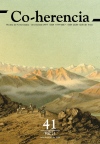The “Immanent Suffering” in the Unraveling of Temporality
Main Article Content
Keywords
Dasein, immanence, pain, phenomenology, suffering, temporality
Abstract
Biomedical sciences have developed methodological frameworks to establish pain as an object of study and overcome its high burden of subjectivity. However, these approaches generate a naturalistic bias that prevents the consideration of “pain” as a phenomenon of suffering. In this sense, the objective of the article is to identify a type of suffering that escapes the consideration of pain, from the biomedical approach, because it emerges in the unraveling of temporality. The thesis of the article maintains that, after the alteration of the temporal intentional tissues of consciousness, one endures an “immanent suffering”. In order to address these aspects, the article is divided into three sections: (i) Immanent Suffering. (ii) From Symptom to Cause. Passive Alterations of Consciousness and their Repercussions on the Body. (iii) A Deep Experience of Sadness.
Downloads
References
Améry, J. (1999). Levantar la mano sobre uno mismo. Discurso sobre la muerte voluntaria (M. Siguan Boehmer y E. Aznar Anglés, Trads.). Pre-Textos.
Blumenberg, H. (2011). Descripción del ser humano (G. Mársico y U. Schoor, Trads.). FCE.
Canguilhem, G. (1978). Lo normal y lo patológico (R. Potschart, Trad.). Siglo XXI.
Cassel, E. J. (1982). The Nature of Suffering and the Goals of Medicine. The New England Journal of Medicine, 306(11), 639-645. https://doi.org/10.1056/NEJM198203183061104.
CIE-10-ES. Clasificación Internacional de Enfermedades – 10.a Revisión Modificación Clínica. Tomo II: Procedimientos. (2022, enero, 4.a ed.). Ministerio de Sanidad [España], Secretaría General Técnica. https://n9.cl/w0vx4q.
D’Angelo, D. (2021). To Be or Not to Be at Home. Heidegger and Derrida reading Sophocles. Kritike, 40(3), 107-126. https://n9.cl/xg3af.
Descartes, R. (2008). Meditaciones acerca de la Filosofía Primera. Seguidas de las objeciones y respuestas (J. A. Díaz, Trad.). Universidad Nacional de Colombia.
Frank, A. W. (2001). Can we Research Suffering? Qualitative Health Research, 11(3), 353-362. https://doi.org/10.1177/104973201129119154.
Freud, S. (2001). Obras completas. Tomo 7. (1916-1924). Ensayos XCVIII al CXLIV (L. López-Ballesteros y J. Numhauser Tognola, Trads.). Biblioteca Nueva.
Fuchs, T. (2007). The Temporal Structure of Intentionality and Its Disturbance in Schizophrenia. Psychopathology, 40(4), 229-235. https://doi.org/10.1159/000101365.
Fuchs, T. (2010). Phenomenology and Psychopathology. En D. Schmicking & S. Gallagher (Eds.), Handbook of Phenomenology and Cognitive Science (pp. 546-573). Springer. https://doi.org/10.1007/978-90-481-2646-0_28.
Geniusas, S. (2020). The Phenomenology of Pain. Ohio University Press.
Heidegger, M. (2002). Interpretaciones fenomenológicas sobre Aristóteles. Indicación de la situación hermenéutica. [Informe Natorp] (J. A. Escudero, Trad.). Trotta.
Heidegger, M. (2012). Ser y tiempo (J. E. Rivera, Trad.). Trotta.
Heidegger, M. (2013). Seminarios de Zollikon (Á. Xolocotzi Yáñez, Trad.). Herder.
Johnson, F. (2022). El melancólico ensimismamiento. ¿Un problema consigo mismo o una aporía en el sí mismo? Ideas y Valores, 71(178), 161-185. https://n9.cl/00akx.
Leyte, A. (2005). Heidegger. Alianza.
Mitchell, D. (2019). The Myth of the Cave and the experience of illness. Journal of Evaluation in Clinical Practice, 25(6), 1003-1009. https://doi.org/10.1111/jep.13175.
Padrón, H. J. (2008). Consideraciones sobre la agonía y el morir humano. Vida y Ética, 9(2), 211-248. https://n9.cl/nc2ni.
Platón. (2014). República (C. Eggers Lan, Trad.); Parménides; Teeteto. RBA.
Rodríguez Suárez, L. P. (2016). Destrucción fenomenológica del concepto tradicional de “psique” y psiquiatría en los Zollikoner Seminare. Differenz. Revista Internacional de Estudios Heideggerianos y sus Derivas contemporáneas, 3(2), 135-150. https://n9.cl/98mjw.
Rodríguez Suárez, L. P. (2019). La naturaleza hermenéutica de la experiencia corporal y del fenómeno del dolor según Heidegger. Claridades. Revista de Filosofía, 11(1), 187-211. https://doi.org/10.24310/Claridadescrf.v11i1.5454.
Sanz Peñuelas, M. (2017). Fenomenología y enfermedad: aproximación al estudio de la experiencia patológica a la luz del “primer Heidegger”. [Tesis doctoral, Universidad Autónoma de Barcelona]. https://n9.cl/oevt4.
Valle Jiménez, D. (2018). Dolor y autoexplotación en la era digital. Contrastes. Revista Internacional de Filosofía, 23(3), 163-180. https://n9.cl/iaxik.
Van Hooft, S. (1998). Suffering and the Goals of Medicine. Medicine, Health Care and Philosophy, 1(2), 125-131. https://doi.org/10.1023/a:1009923104175.
Yáñez, Á. X. (2020). La verdad del cuerpo. Heidegger y la ambigüedad de lo corporal. Estudios de Filosofía, (61), 125-144. https://n9.cl/bqkw3.





